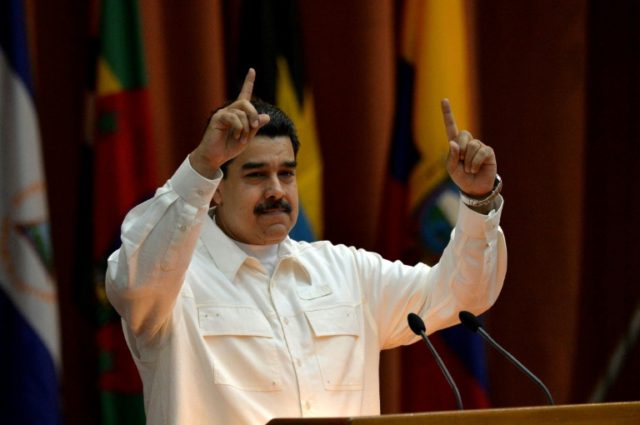U.S. Ambassador to the United Nations Nikki Haley condemned Venezuelan dictator Nicolás Maduro on Friday for launching a campaign against local Catholic leaders who use their pulpits to urge the government to seek peace and end violent repression of dissidents.
Maduro claimed on television last week that some priests and bishops have run afoul of Venezuela’s recent “law against hate and fascism” by making public statements against the malnutrition, disease, crime, and violent attacks on pro-democracy advocates that have come to define Maduro’s regime.
The “national constituents assembly,” an illegal legislature Maduro created and filled with family members and cronies, “passed” the law last year over the nation’s constitutional legislature, the National Assembly.
“By targeting religious leaders—who promote peace and provide hope for believers—the regime continues to show that it cares only for preserving its own power and cares nothing about the basic human rights and welfare of its citizens,” Haley said in a statement released Friday. “We continue to stand strongly with the Venezuelan people in their battle to restore their democracy in the face of a brutal dictator.”
Maduro had appeared on television last week urging legal action against Catholic leaders who speak out against the regime.
“We must look into … whether these words emitted by some of these characters are not truly hate crimes that appear to generate confrontation among Venezuelans,” Maduro said of the nation’s Catholic priests, who he referred to as “devils in cassocks.” He also accused the Catholic Church in Venezuela as being full of “malice,” “poison,” and “perversion” in various parts of his speech.
Maduro identified two priests, Monsignors Víctor Hugo Basabe y Antonio López Castillo, as having pronounced themselves against the regime.
Basabe had reportedly noted that “thousands of Venezuelans are scavenging through garbage,” a documented truth. Basabe had reportedly called for Maduro and his regime to leave power during a homily. He also reportedly told churchgoers that Maduro’s government “are stubbornly refusing to accept that the fundamental cause of all the ills in Venezuela is the insistence on an economic, political, and social model that denies God and human dignity,” referring to socialism.
Maduro, however, said on television that Basabe had called all government sympathizers a “plague.”
Following Maduro’s screed, Basabe clarified that the head of state “put words in my mouth that I did not say.”
“How sad that a national leader can lie so scandalously before an entire country,” Basabe lamenting, affirming that he would stand by his statements in the homily that irked Maduro.
Maduro’s “law against hate,” approved in November, was openly designed to prevent public debate about the direction that his regime is taking the nation in. “This is primarily a law against fascism,” Maduro said at the time, arguing that it would help “heal the divisions in our country and prevent further protests, banning discrimination against someone because of the color of their skin, their social condition, or their political ideology.”
While primarily targeted laymen dissidents, Maduro has had to contend with stern rejection from the Venezuelan Catholic leadership, the nation’s Episcopal Conference (CEV). Priests across the nation urged their followers to organize against the “national constituents assembly” and published multiple letters against Maduro.
In July 2017, the CEV referred to Maduro’s government as a “dictatorship” in an official statement condemning the assembly and its plan to draft a new constitution more favorable to Maduro. The current constitution took hold under Maduro predecessor Hugo Chávez, yet protesters have cited its provisions allowing for the overthrow of illegitimate governments to oust Maduro.
In response to the CEV’s protests and dissidents’ use of Catholic communities to organize, Maduro has ordered violence against churches. In 2017, Caracas’ churches were among the most vulnerable. In January, pro-government thugs locked believers in the capital’s San Pedro Claver Church and took the clergy away from the altar, forcing those trapped inside to listen to a pro-Maduro rant instead of the day’s sermon. In June, unknown assailants destroyed the altar of Santa Rosa de Lima church and stealing the chalice used for Communion, the Eucharist, and the tabernacle.
A month later, a socialist gang once again trapped believers in a church, this time the capital’s Carmen Church, and took Archbishop of Caracas Jorge Urosa Savino hostage, along with hundreds congregated there.
In August, the CEV headquarters in Caracas fell victim to an act of vandalism, apparently in an attempt to intimidate it into silence.
While Venezuela’s clergy have loudly stood against socialism, Pope Francis—who mediated failed talks between Maduro and the pro-socialist opposition in 2016—has largely abstained from the conversation. This was particularly noticeable last week as the pope toured Latin America, standing beside a Chilean bishop accused of sex abuse, lecturing believers to accept mass immigration, and failing to condemn the socialist Venezuelan regime. Instead, the pope offered that he was “thinking of beloved Venezuela, facing an ever more dramatic and unprecedented crisis” and hoped for more “dialogue” between the regime and its chosen “dissidents.”

COMMENTS
Please let us know if you're having issues with commenting.